5 Reasons the Justise Winslow Trade Works
In February, the Miami Heat made a major move in trading Justise Winslow, Dion Waiters and James Johnson as part of a three-team deal. Miami managed to flip three players who were not contributing for players who provided production immediately. But was it the right move to make?
In the wake of the trade, a Heat Nation civil war ensued between the “Bustise Winslow” and “Justise Better” camps. And while it’s difficult to see a 24-year-old former lottery pick leave for past-their-prime veterans, Winslow’s lack of production hampered the team’s ability to move forward. He may find new life in Memphis, but it seemed like he’d never breakthrough with the Heat.
So here are five reasons why trading Justise Winslow works for the Miami Heat.
1 – Justise Winslow’s Availability
As a rookie, Justise Winslow played 78 games for the Heat. That remains the high-water mark for Winslow during his five-year career. By a wide margin. He missed well over 100 games while with Miami, including the bulk of two of his five seasons.
This year, real questions clouded Winslow’s desire to play. Although plagued by back issues, it’s been said that Winslow and the Heat could not agree on treatment or a timetable for return. This friction with the organization greased the wheels of a potential deal despite Winslow’s youth and potential.
The uncertainty of Winslow’s availability was replaced by a pair of players who’ve produced. Jae Crowder saw the floor in 13 of Miami’s 15 games after his February 6th acquisition. He’s posted 11.9 points-per-game and netted over 39 percent of his three-point attempts. Winslow’s career-high PPG is 12.3 and he’s never made threes at that high of a clip.
Andre Iguodala headlined the deal for Miami. Iggy played 14 of the 15 games after the trade, sitting out just the first one (like Crowder). He’s provided defensive flexibility and his 37 percent clip from three has kept opposing teams accountable.
Miami managed to unload three players in Winslow, Waiters and Johnson that were not producing at any meaningful level during the playoff push. They swapped them out for three players (Crowder, Iguodala and Solomon Hill) who could.
2 – Cap Flexibility
While the COVID-19 crisis has cast uncertainty on the league’s finances, Miami making this move in February seemed financially motivated. By flipping Winslow, Waiters and Johnson, the Heat freed up cap space for not only the coming offseason, but also the following one, when Giannis Antetokounmpo and Victor Oladipo could be available.
Winslow was set to make $26 million over the next two seasons, though the team held the contract’s option for 2021-22. Johnson had $16 million coming his way, and Waiters waited on another $12 million for 2020-21.
Moving off of those contracts saved Miami nearly $55 million in total and more than $40 million for this offseason. The Heat have a number of internal free agent options, including Goran Dragic, Meyers Leonard, Derrick Jones Jr. and Crowder. This deal could give Miami the means to bring all four contributors back. They could also look to add other players like Davis Bertans, Danilo Gallinari, or maybe even Serge Ibaka or Paul Millsap.
Yes, the team inked a $30 million extension with Iguodala as part of the trade. But the $15 million owed to Iggy for 2021-22 is a team option. In addition, the Warriors hold a $17.2 million trade exception that could see Miami create even more cap space if he’s traded back to Golden State.
Watch the Heat create more cap space by sending Iggy back to GSW in October https://t.co/qVBaO11oPF
— Greg Sylvander (@GregSylvander) June 20, 2020
3 – 3 & D Upgrade over Justise Winslow
While Justise Winslow may have wanted to be a point guard, the most obvious role for him to fill with this Heat team was as a 3-and-D wing. Winslow’s strength is on defense. He flashed that ability as a rookie, switching to defend multiple positions during Miami’s playoff run that year.
Offensively, Winslow’s most glaring weakness seemed to be his distance shooting. (Although finishing around the rim was also an issue.) While he’s improved from three, Winslow wasn’t a threat to opposing defenses standing beyond the arc.
This season, both Crowder (.318) and Iguodala (.375) have netted three-point attempts at a higher clip than Winslow (.222). With the Heat, Crowder has hit 39 percent from three.
Crowder sports a higher Defensive Win Shares figure (2.0), with Iguodala and Winslow tied at 0.4. In Defensive Box Plus/Minus, Iguodala leads (1.9), followed by Crowder (0.3) then Winslow (minus-0.1).
Crowder and Iguodala both provide Heat head coach Erik Spoelstra with switchable wing defenders who can play both on the perimeter and on the inside.
4 – Veteran Leadership
Iguodala is a 16-year veteran, Finals MVP and three-time champ. He’s an intelligent and articulate player who upgrades Miami’s basketball IQ. He’s played nearly 150 playoff games and has made four Finals appearances. This experience is something Winslow couldn’t provide.
Crowder’s resume isn’t nearly as decorated, but he is playoff-tested. A seven-year veteran, Crowder has played in more than 50 playoff games and made 30 starts. He helped defend LeBron James for Boston in the 2017 Eastern Conference Finals. He averages over 10 points-per-game and 32 percent on threes in the playoffs.
In just his fifth NBA season, Winslow has played 18 playoff games. The bulk of those (13) came in his rookie season. And his unwillingness to return to play for the Heat this season casts a disparaging mark on his resume as a leader.
5 – Offensive Clarity
The allure of a Jimmy Butler-Justise Winslow defensive pairing enticed everyone. Their brief snippets of play, with Bam Adebayo behind them, left Heat fans wanting more. But, as great as those defensive sequences were, on the other end of the floor, things were clunky.
Winslow held a well-known desire to be a point guard. He wanted the ball in his hands and flashed some ability as an offensive facilitator at times in his career. In the open court, he moved well and attacked, though finishing was an issue. But in the half court, the offense could stall with him at the helm, especially if Winslow wasn’t making his jumpers.
Butler will be the primary ball handler for Miami in this NBA restart. Kendrick Nunn should stand as the secondary option, with Dragic taking that role off the bench. Much of the half-court offense will be fed through Adebayo on the elbow, leaving Crowder and Duncan Robinson to man corners and wings.
Dealing Justise Winslow afforded Miami with a simplified offensive setup. Each rotation player now has a set role, both on the defensive end and offensively. The ball will be with Butler, Adebayo, Dragic and Nunn for the majority of the game. Winslow would’ve muddied those waters on offense and flipping him for Crowder and Iguodala keeps things clear.
New episode!
Reviewing the Justise Winslow deal. How does it look now?
@seltzermayberg
@gtlawyersfl https://t.co/NVVQ3mPXPp— Five Reasons Sports Network (@5ReasonsSports) June 23, 2020
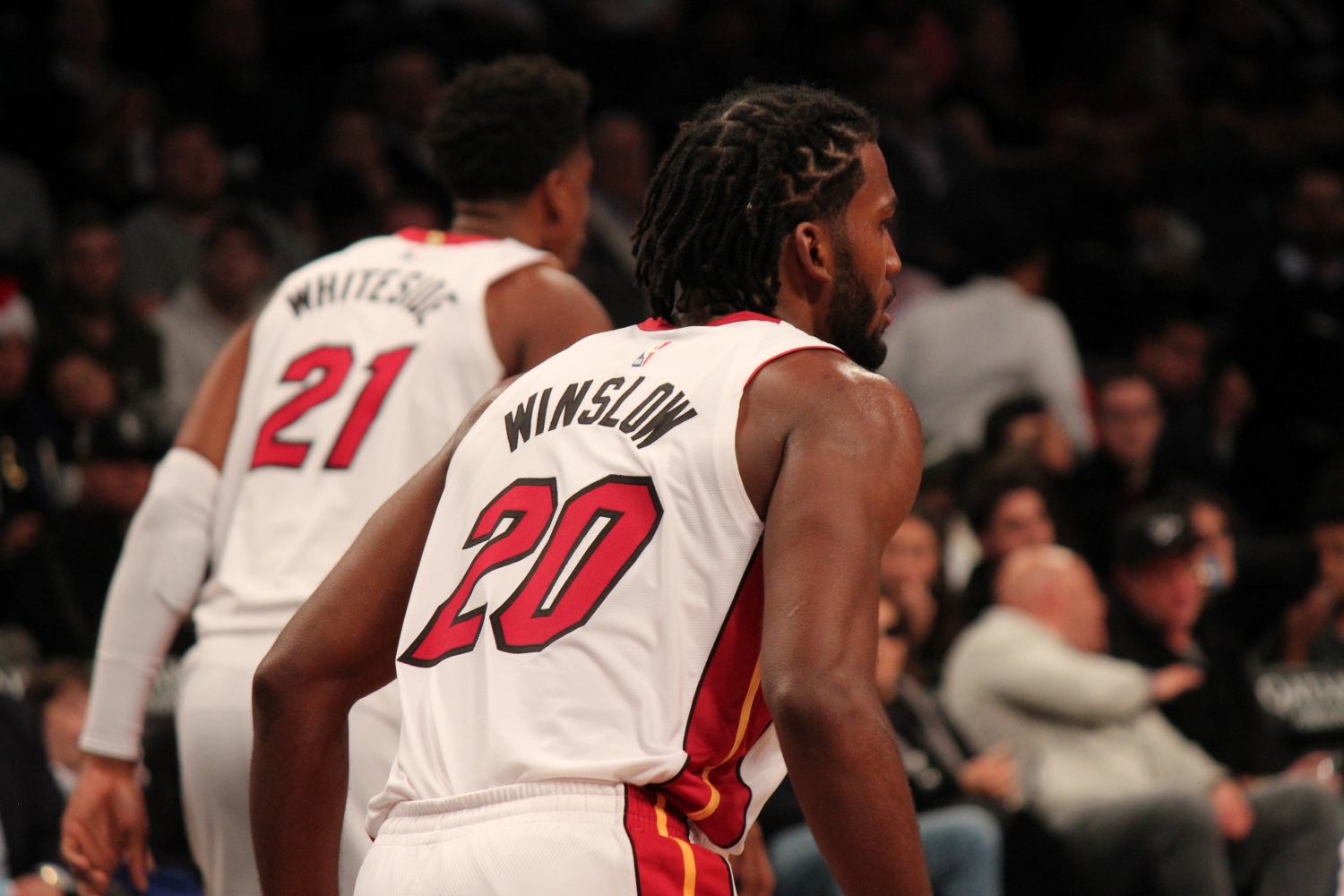
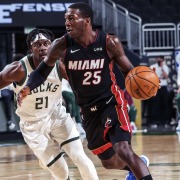
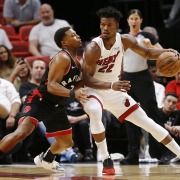
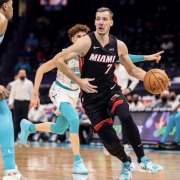
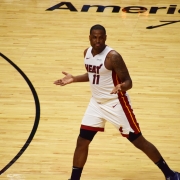
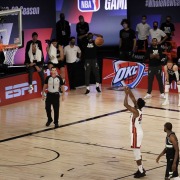
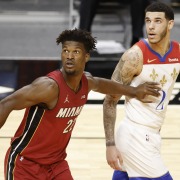


Perfect article. Very detailed. Now I can appreciate the trade! Thank you!
Love the article, great points
Great read!